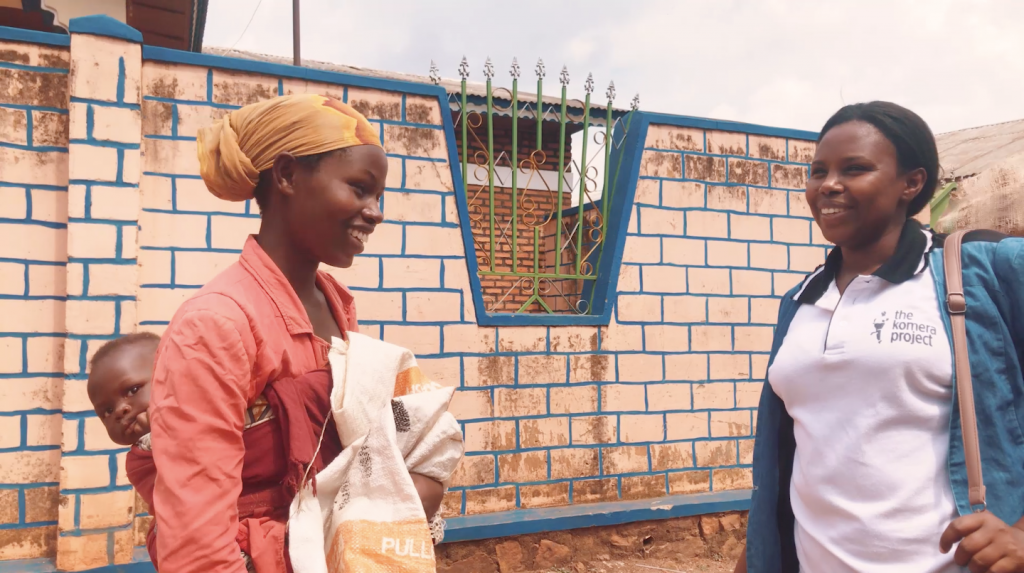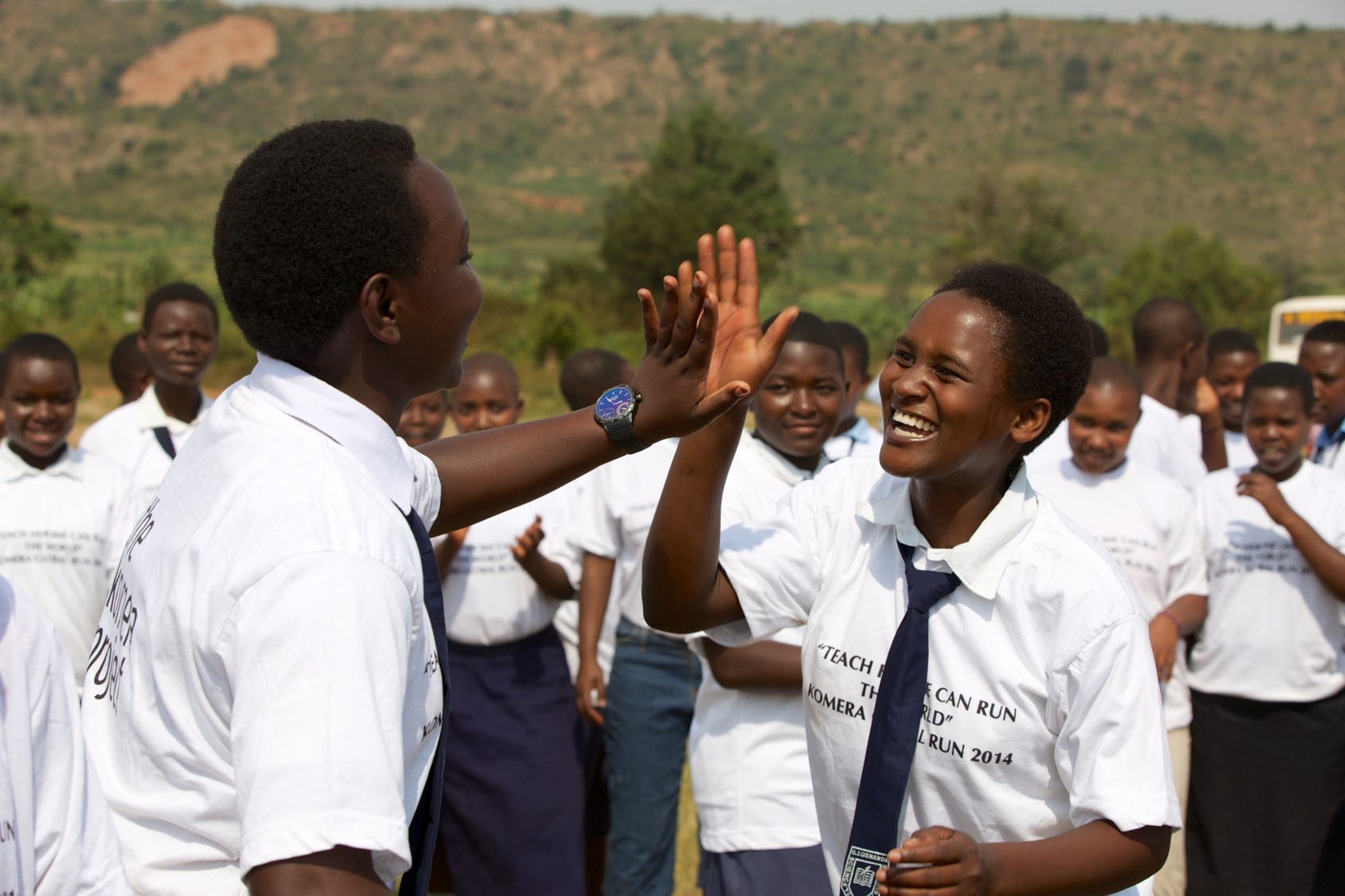
Mission
Komera develops self-confident young women through education, community development, and health.
Life Challenges of the Women Served
Rwanda is a small country still recovering from the long-term effects of the 1994 Genocide against the Tutsi, which led to massive destabilization of the social and justice systems within the country. To date, patriarchal attitudes and cultural beliefs have continued to limit the participation of women and girls in education and other social development interventions, presenting barriers to gender equality. Rwanda boasts one of the top countries with female participation in leadership, and the government of Rwanda has long demonstrated its support for gender equity and education for all. However, social norms and barriers continue to hamper the advancement of women and girls especially in rural communities There is much work to be done to change the negative stereotypes that limit opportunities for women and girls. In the community in which Komera works, Kayonza District, 80 percent of families are farmers, and opportunities for economic empowerment, growth, and mentorship are sparse. Expectations for young women are to marry and raise children, and this mindset limits potential for girls.
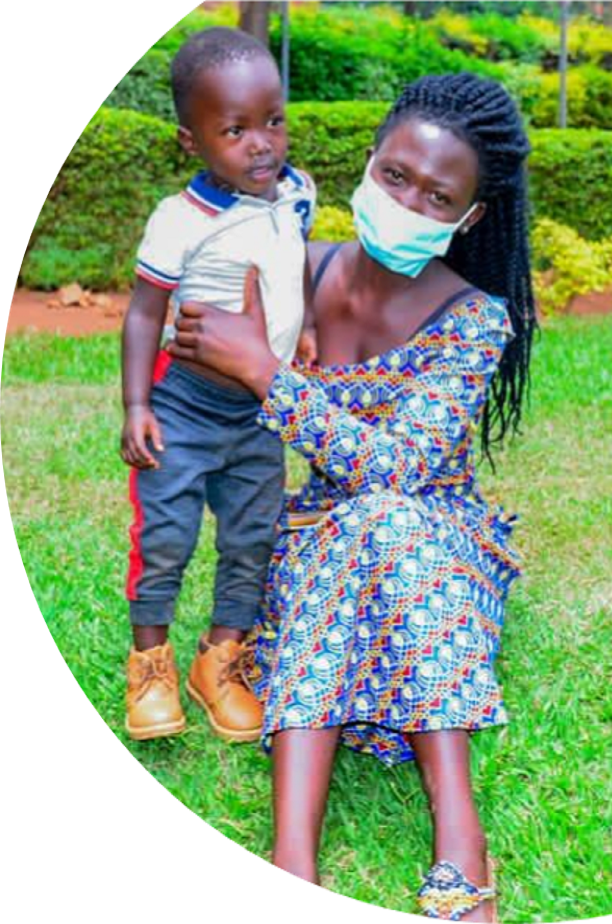 Among the challenges that are shattering the dreams of adolescent girls is the rise in teenage pregnancy and early marriage that is putting girls and young women at risk. Teenage pregnancy rates in Rwanda rose from 6.1 percent in 2010 to 7.3 percent in 2015. In most recent studies, the rates have risen to above 12 percent. In general, there is no support for teenage mothers after getting pregnant: recent reports show that 99 percent didn’t receive any legal support/assistance; 88 percent did not receive any support from the child’s father; and only 5 percent of babies are officially registered.
Among the challenges that are shattering the dreams of adolescent girls is the rise in teenage pregnancy and early marriage that is putting girls and young women at risk. Teenage pregnancy rates in Rwanda rose from 6.1 percent in 2010 to 7.3 percent in 2015. In most recent studies, the rates have risen to above 12 percent. In general, there is no support for teenage mothers after getting pregnant: recent reports show that 99 percent didn’t receive any legal support/assistance; 88 percent did not receive any support from the child’s father; and only 5 percent of babies are officially registered.
There are many issues contributing to unwanted teenage pregnancies in Rwanda. Many health centers have services available for teenagers; however, there is a reluctance to enter into the health centers and ask for contraceptives. The majority of healthcare workers come from the communities where they work and often know the young men or women. There is a large amount of shame in admitting to sexual activity. Therefore, teenagers are more prone to continue risky behavior rather than embarrass themselves or their families. As women account for close to 50 percent of the 12 million people in Rwanda, keeping women healthy, safe, and active members of the workforce and community should be the utmost priority.
The Project
Through this grant from Together Women Rise, Komera will provide a pathway out of poverty for both teen mothers and vulnerable adolescent girls to transform their futures through education on sexual reproductive health (SRH), access to family planning and resources, and advocacy work for the rights of women and girls to change negative stereotypes that prevent women from reaching their full potential.
The Komera Girls Sexual Reproductive Health Initiative aims to increase knowledge and skills to support adolescent girls’ and teenage mothers’ empowerment by fostering behavioral change, and to prevent adolescent pregnancy through SRH training, economic empowerment, and the creation of supportive families and communities.
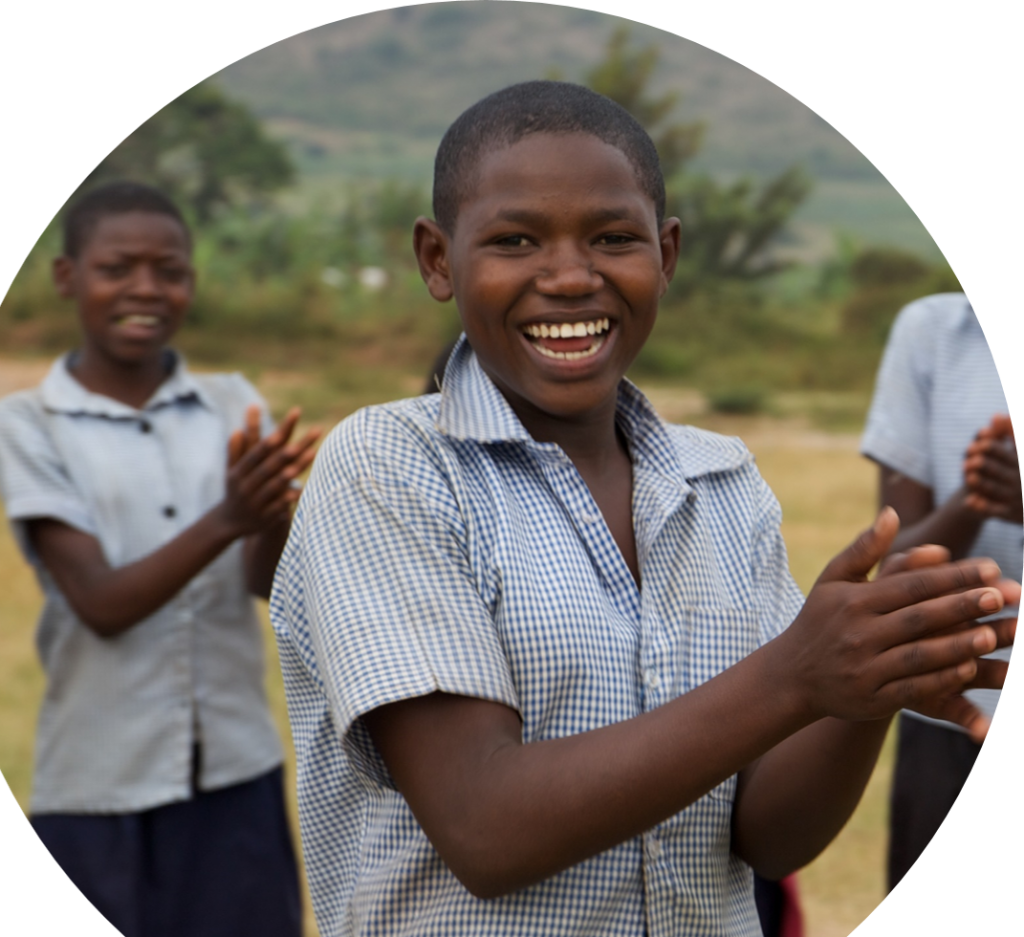 Project objectives:
Project objectives:
- Implement high-quality, comprehensive training for adolescent girls with knowledge about self-confidence, decision making, SRH, and teen pregnancy prevention.
- Strengthen the self-confidence, skill based training, and economic empowerment for teen mothers with an aim of rebuilding their confidence, resilience, decision-making skills, and economic prosperity.
- Ensure that adolescent girls and teenage mothers are emotionally strong and safe by promoting a supportive environment that respects social norms and gender equality through engagement with parents and communities.
The project will consist of three components:
Adolescent Girl, Preventative Program: Transform relationships with family and peers with a mentorship and social-emotional support program, developing self-love and self-confidence, while making SRH a topic of discussion within families – Komera will use yoga and meditation to create body appreciation and self-love, to increase participant’s self-worth, and as a grounding practice for acceptance. Komera social workers will collaborate with community-based mentors in weekly small groups. They will mediate with families to resolve conflicts that have resulted from the teen pregnancy and shame from the community. Adolescent girls in the community will participate alongside teen moms to learn about SRH and how to have healthy relationships. The purpose is to teach adolescent girls at a young age before they may become pregnant by leading with SRH education and mentorship support.
Female Health Counseling: Advocate for young women and girls through Komera’s health counseling post where girls and teen moms can learn about SRH and gender-based violence, as well as access essential feminine hygiene and family planning supplies – A Komera Social Worker and Nurse will manage this program. Komera mentors will break the stigma of using birth control by accompanying women to the local health clinics to advocate for them to take control of their health with family planning. This has been the biggest barrier for girls to use contraceptives, and having a mentor will open the door for girls to learn about SRH and feel empowered about their own health. There is a huge need to provide feminine hygiene supplies and menstruation education in Komera’s community, so access to pads, soap, and sanitary supplies is essential to keep girls healthy and safe.
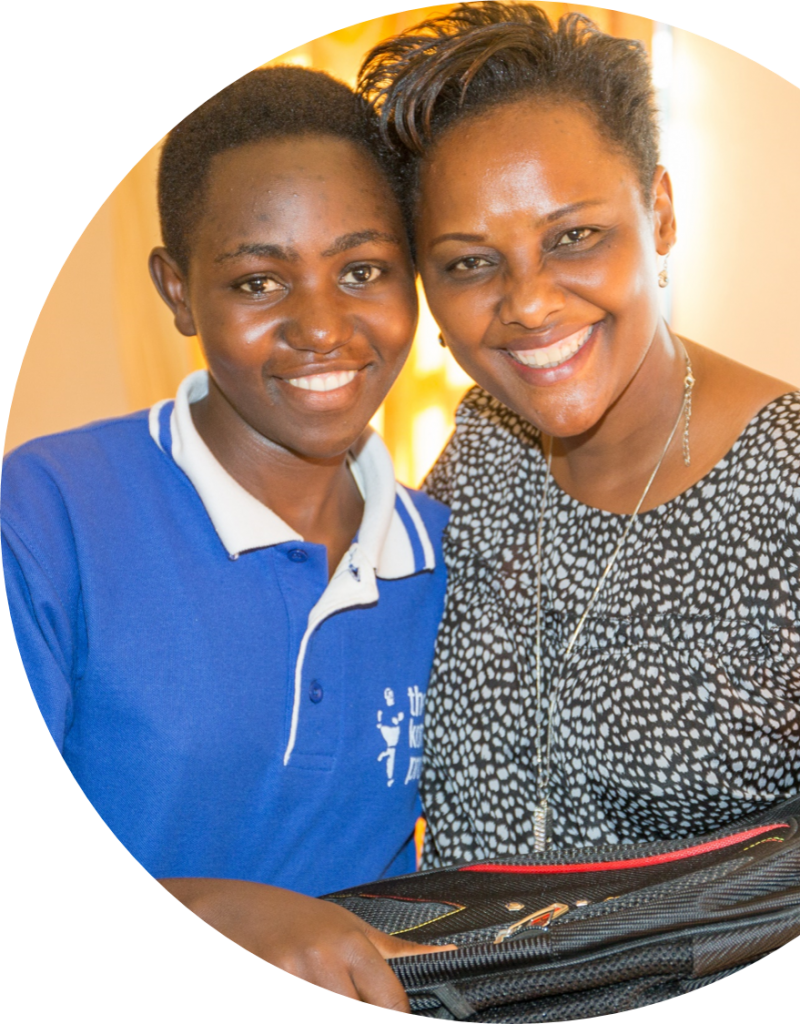 Teen Mom Economic Empowerment: Identify the skillsets of teen moms to align with a career pathway, and participate in a vocational skills program that cumulates with a certificate and toolkit to launch them into the workforce as empowered, skilled, confident female leaders who are excited about their future – Teen moms in the community are neglected and forgotten about, but not at Komera. They believe teen moms can contribute to society and become successful in business. Using Komera’s business development curriculum, teen moms will be educated and supported to find their passion. A series of vocational trainings will provide the resources they need, and upon graduation the mothers will receive toolkits with essential supplies and small capital grants to launch their businesses.
Teen Mom Economic Empowerment: Identify the skillsets of teen moms to align with a career pathway, and participate in a vocational skills program that cumulates with a certificate and toolkit to launch them into the workforce as empowered, skilled, confident female leaders who are excited about their future – Teen moms in the community are neglected and forgotten about, but not at Komera. They believe teen moms can contribute to society and become successful in business. Using Komera’s business development curriculum, teen moms will be educated and supported to find their passion. A series of vocational trainings will provide the resources they need, and upon graduation the mothers will receive toolkits with essential supplies and small capital grants to launch their businesses.
The project will empower and transform the lives of young women by building their confidence and fostering behavioral change that will influence their decision-making and preventing teenage pregnancy. Komera anticipates meaningful results that include improved positive behavioral change of adolescent girls towards sexuality, confident young women, and supportive families to women and girls. The aim is to increase the confidence and economic empowerment of teenage mothers, so they can make decisions in the matters that affect their lives and support their families economically. Additionally, a significant increase in use of family planning through the support of the nurse at Komera is anticipated. The aim is to advocate and create a community that supports and encourages women and girls as healthy, productive members of society by including women in the workforce and economic activities. A major factor hindering advancement of women and girls in the Kayonza District is the negative stereotypes and gender norms that prevent women from achieving their potential. These efforts can lead to long-term community change.
The project’s direct beneficiaries will include 250 teenage mothers in the adolescent mothers’ program, 250 adolescent girls in the pregnancy preventive program, and 500 community members who are parents (one parent per girl) of the beneficiaries in both the preventive program and teen mothers’ program in Kayonza sector. Of the 1,000 directly impacted beneficiaries, 875 will be girls and women while 125 will be men.
On average a rural family in Rwanda has between five to seven family members. When Komera works with 1,000 members annually, they will also reach their families and households, and will indirectly benefit 6,500 people on average in the grant year.
1,000 direct beneficiaries (teen mothers, adolescent girls, parents) and 6,500 indirect beneficiaries (family members)
UN Sustainable Development Goals
![]()
Questions for Discussion
How do you think emphasizing confidence and agency relate to sexual reproductive health education?
Why do you think focusing on younger adolescent girls is important in this project?
As scholars become mentors, what impact do you think that has on girls in the community?
How the Grant Will be Used
Together Women Rise’s grant of $35,000 will help fund the following:
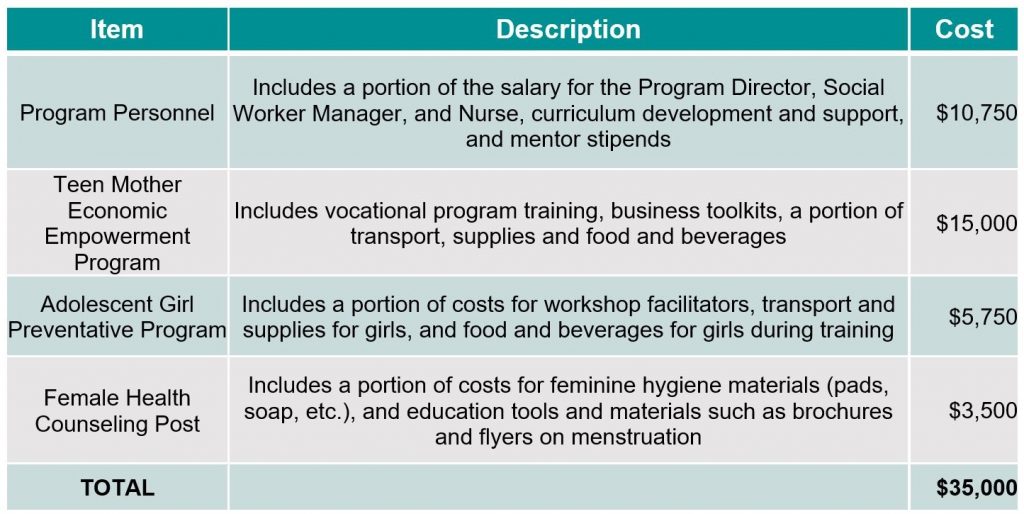
Why We Love This Project/Organization
Komera means strong and courageous in the local language. This project emphasizes self-confidence and building agency and leadership in the target population. Komera fosters behavioral change, knowledge attainment, economic empowerment, and skill building for adolescent girls and teenage mothers to build strong families and communities.
Evidence of Success
Komera currently works directly with 150 young women in educational programing including secondary, post-secondary vocational, and university students, 270 teen mothers in the Pathway to Power Program, and 1,300 students in the Primary School Program. In Komera’s Nabacu sport and advocacy program, the organization reaches more than 400 community members at every meeting and advocacy campaign event. In its parent cooperative, Komera works directly with 110 parents, reaching an estimated 770 individuals. Komera’s impact annually is well in the range of 10,000 people based on the number of households reached. Komera works with the entire community, since in order to improve women’s rights, everyone must be engaged. The secondary school program serves the most vulnerable yet promising young women in the district. All of the families Komera works with are among the poorest families in the region. Most of the family members have not completed secondary school and live below the poverty line. The majority of parents are subsistence farmers.
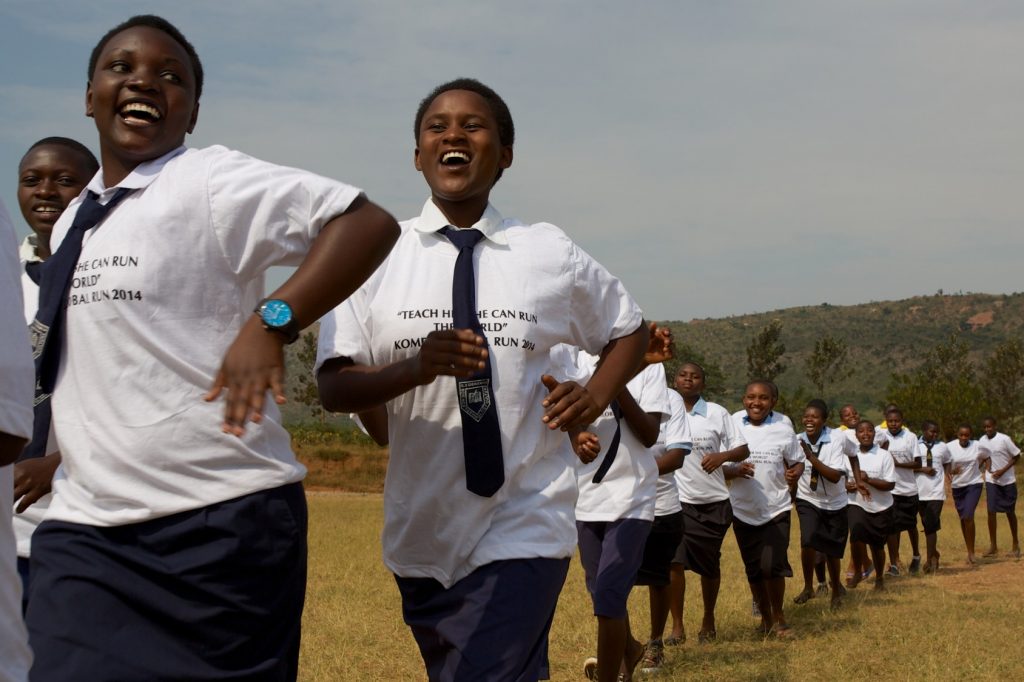
Komera has graduated 105 girls from secondary school to date. Graduation rates over the past five years have been 100 percent, compared to the estimated 18 percent for Rwanda. Currently, 75 percent of Komera’s students move to university education, compared to the less than 8 percent of young women nationwide. The Komera Guardian Co-Operative, an economic program led by Komera guardians and parents, saw a 91 percent improvement in families’ housing through constructing new homes or rehabilitating, building sanitary facilities, building safe clean kitchen/cooking space, installing solar on their homes for electricity, and purchasing animals and land. Eighty-five percent of families were able to send additional children to school or support additional children with required school materials and supplies. Ninety-one percent of parents saw an increase in the health and wellbeing of their entire family, and 97 percent are more involved in the lives of their children in school and at home.
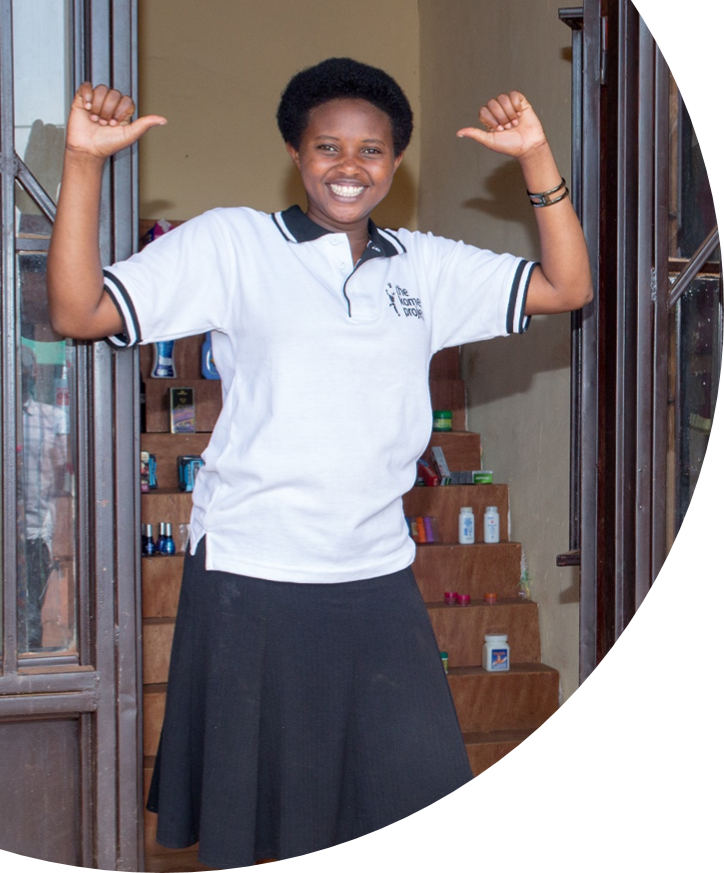 Komera’s Pathway to Power teen mother program has seen drastic, significant, positive results, and out of the 75 girls in the last cohort, 69 are on family planning, 73 started a monthly savings account, and 72 have a successful small business.
Komera’s Pathway to Power teen mother program has seen drastic, significant, positive results, and out of the 75 girls in the last cohort, 69 are on family planning, 73 started a monthly savings account, and 72 have a successful small business.
Komera believes that in order for girls to be successful, they must believe in themselves and their own abilities, and have the skills they need to affect change in their own lives. Agency is one of the most important outcomes of Komera’s collective programmatic work. Overall, Komera is significantly improving girls’ agency as evidenced by an increase of 54 percent of girls scoring above average at endline as compared to baseline. Additionally, all girls (100 percent) passing through the Komera program leave with above average scores on agency. Komera’s work in leadership camps, mentorship programs, and its holistic program of support is borne out in impact data collected showing girls with vastly improved scores on their confidence in effecting change in their lives and overall high scores on women’s empowerment.
Voices of the Girls
“I gained hope, confidence, learned to work hard to get money and buy all my child’s needs, and living happily with my family, not begging them but giving them peace. I used to quarrel with my parents, but we reconciled. Long live Komera.” – Clarisse, Teen Mother
“I got pregnant when I was 20 years old. Life was so tough… Komera taught us to work. I now work with my mother. I gained a home and have new goals.” – Racheli, Teen Mother
“My child is doing well. I also look good. I have savings and I will buy a goat. My goal is to have a big shop, in three years to come. I get food and school fees for my child. Thank you Komera.” – Scovia, Teen Mother
“I learned about having self-confidence and know that I still have a chance to succeed.” – Mukanzabandora, Teen Mother
“The care Komera gave me created good relations at home; I was so different from what I am today.” – Janette, Teen Mother
About the Organization
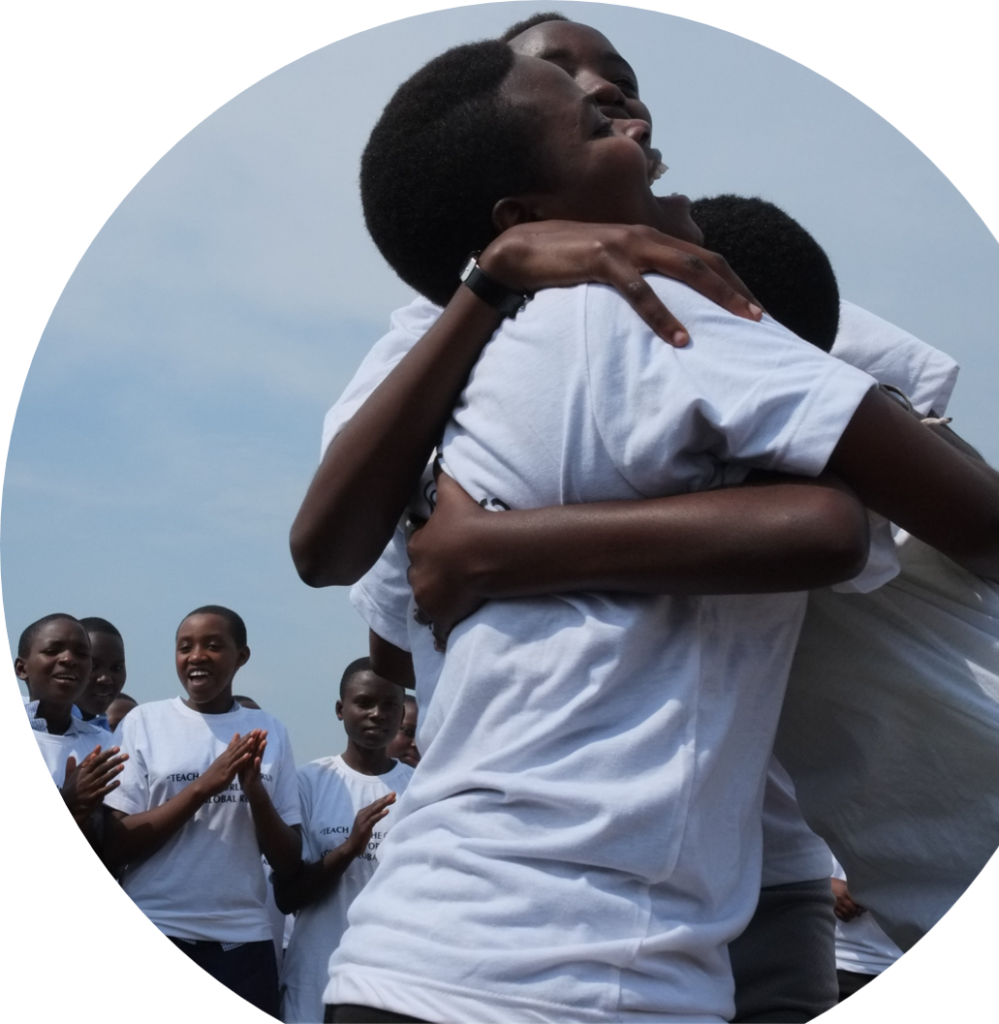 In 2007, Komera founder Margaret Butler, former primary school teacher and former professional runner, spent one year living in a remote village in Rwanda. She explored the countryside during her daily runs, and she often found herself running with groups of boys, but not girls. At the same time, she was learning about the local education system and how more often than not, girls were being left behind in secondary school education. The few brave girls who started running with Margaret inspired her to host a girls-only fun run that promoted the rights and education of Rwandan girls. As the girls took off, shouts of “Komera!” (meaning “be strong and courageous” in the local language) could be heard from the crowd. This inspired the name of the organization, which is dedicated to building self-confidence in one girl at a time. In partnership with the local government and schools, 10 girls were selected to be the first set of Komera scholars to attend secondary school.
In 2007, Komera founder Margaret Butler, former primary school teacher and former professional runner, spent one year living in a remote village in Rwanda. She explored the countryside during her daily runs, and she often found herself running with groups of boys, but not girls. At the same time, she was learning about the local education system and how more often than not, girls were being left behind in secondary school education. The few brave girls who started running with Margaret inspired her to host a girls-only fun run that promoted the rights and education of Rwandan girls. As the girls took off, shouts of “Komera!” (meaning “be strong and courageous” in the local language) could be heard from the crowd. This inspired the name of the organization, which is dedicated to building self-confidence in one girl at a time. In partnership with the local government and schools, 10 girls were selected to be the first set of Komera scholars to attend secondary school.
Komera was established in partnership with a local team of social workers who knew and understood the issues that young women were facing. Education was an imperative, but furthermore, they knew that more was needed in order to truly see young women develop into female leaders. Since 2007, Komera has established Rwandan leadership with a focus on holistic care for adolescent girls and their families. This means girls receive healthcare, economic and advocacy training, and community support in addition to education.
Komera has been working in the Kayonza district of Rwanda for a decade, implementing education, community development and health and wellness programming to thousands of young women, youth and families. Komera acknowledges that education alone is not enough to develop self-confident young women, that they also must provide a support system for young women to reach their potential. Komera’s holistic model includes a focus on leadership training, mentorship, health and wellness, career guidance, and family support to create an ideal environment for young women and their communities to thrive.
In August 2020, Margaret Butler stepped down from her role as Executive Director, and continues to support Komera with a seat on their US Board. Dativah Bideri was promoted to Executive Director and leads the organization with vision and passion from Rwanda.
Where They Work
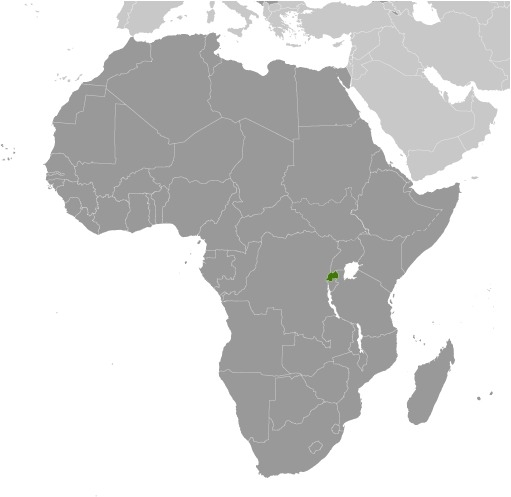
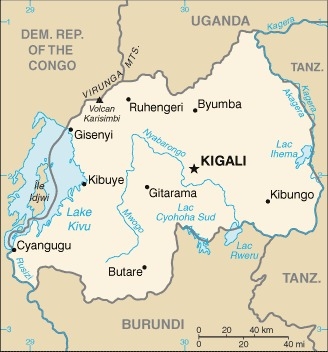
Rwanda is located in Central Africa, east of the Democratic Republic of the Congo, north of Burundi. It is one of Africa’s most densely populated countries, with a population of nearly 13 million (July 2021 est.).
Rwanda is a rural, agrarian country with agriculture accounting for about 63 percent of export earnings, and with some mineral and agro-processing. Population density is high but, with the exception of the capital Kigali, is not concentrated in large cities – its nearly 13 million people are spread out on a small amount of land (smaller than the state of Maryland). Tourism, minerals, coffee, and tea are Rwanda’s main sources of foreign exchange. Despite Rwanda’s fertile ecosystem, food production often does not keep pace with demand, requiring food imports. Energy shortages, instability in neighboring states, and lack of adequate transportation linkages to other countries continue to handicap private sector growth.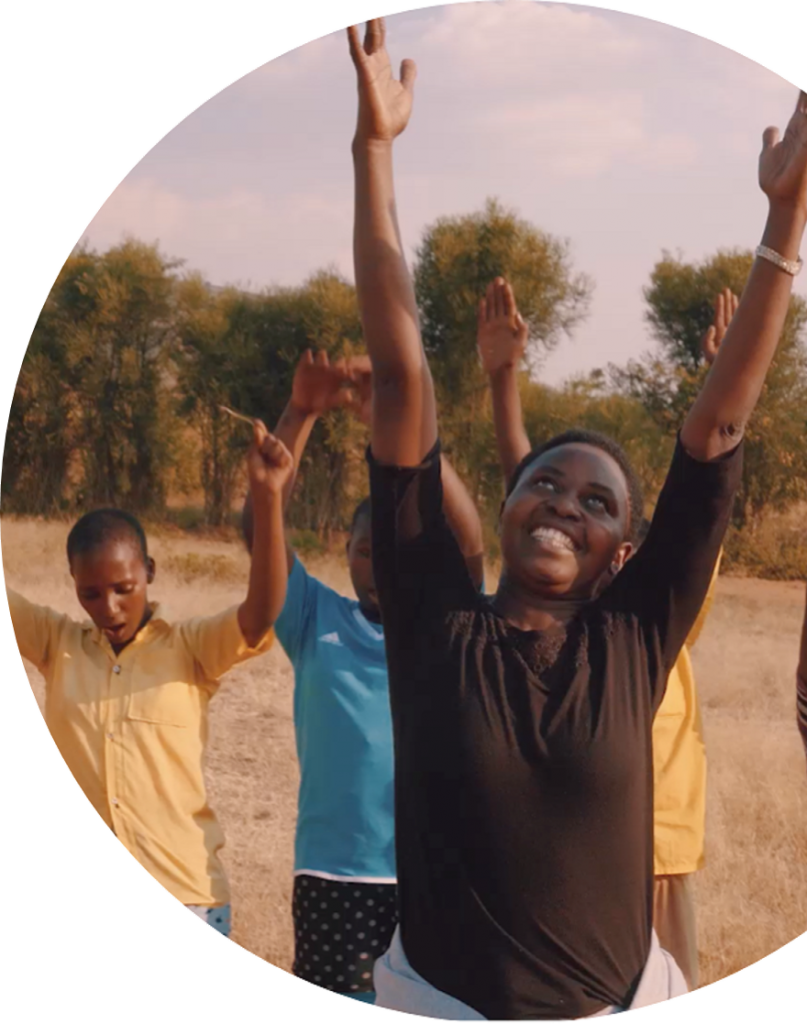
Rwanda’s fertility rate declined sharply during the last decade, following the government’s commitment to family planning, the increased use of contraceptives, and a downward trend in ideal family size. Increases in educational attainment, particularly among girls, and exposure to social media also contributed to the reduction in the birth rate. The average number of births per woman decreased from a 5.6 in 2005 to 4.5 in 2016. Despite these significant strides in reducing fertility, Rwanda’s birth rate remains high and will continue to for an extended period of time because of its large population entering reproductive age. Because Rwanda is one of the most densely populated countries in Africa, its persistent high population growth and increasingly small agricultural landholdings will put additional strain on families’ ability to raise foodstuffs and access potable water. These conditions will also hinder the government’s efforts to reduce poverty and prevent environmental degradation.
The median age in Rwanda is 19.7 years. The birth rate is 27.18 births/1,000 population (2021 est.). Mother’s mean age at first birth is 22.7 years (2014/15 est.). The infant mortality rate is 27.16 deaths/1,000 live births. The maternal mortality rate is 248 deaths/100,000 live births (2017 est.). Life expectancy at birth for the total population is 65.48 years. For men, the expectancy is 63.55 years, and for women the expectancy is 67.47 years (2021 est.).
The literacy rate for the total population is 73.2 percent, including 77.6 percent for males and 69.4 percent for females (2018).
The 1994 genocide decimated Rwanda’s fragile economic base. It severely impoverished the population, particularly women, and temporarily stalled the country’s ability to attract private and external investment. However, Rwanda has made substantial progress in stabilizing and rehabilitating its economy well beyond pre-1994 levels. GDP has rebounded with an average annual growth of 6 – 8 percent since 2003, and inflation has been reduced to single digits. In 2015, 39 percent of the population lived below the poverty line, according to government statistics, compared to 57 percent in 2006.
The government has embraced an expansionary fiscal policy to reduce poverty by improving education, infrastructure, and foreign and domestic investment. Rwanda consistently ranks well for ease of doing business and transparency.
A closer look at equipping girls to avoid pressure for early marriage
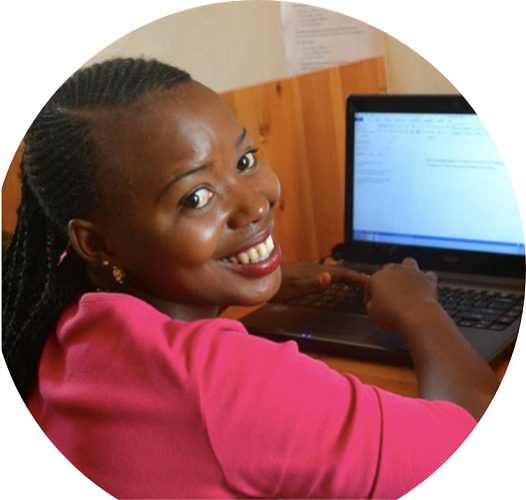 Globally, every day 41,000 girls marry before they are 18 years old. That’s 15 million girls every year. While child marriage can happen to both boys and girls, in most places around the world, the practice mostly affects girls. Girls often get married because of pressure from parents and relatives, poverty, and lack of alternatives. Limited access to quality education and families’ prioritization of boys’ rather than girls’ education contribute to perpetuating the practice. Child marriage may be part of local tradition, parents may believe it safeguards their daughter’s future, or conflict (or even COVID-19) in the country may propel it. The impact of child marriage can be devastating for child brides in terms of lost education and earnings opportunities as well as health risks when giving birth at a young age. Across the world, every year 7.3 million girls become pregnant before they turn 18, and about 2.5 million girls ages 15 or younger give birth. Pregnancy and childbirth complications are the second highest cause of death for girls ages 15 – 19, and every year 3 million girls undergo unsafe abortions.
Globally, every day 41,000 girls marry before they are 18 years old. That’s 15 million girls every year. While child marriage can happen to both boys and girls, in most places around the world, the practice mostly affects girls. Girls often get married because of pressure from parents and relatives, poverty, and lack of alternatives. Limited access to quality education and families’ prioritization of boys’ rather than girls’ education contribute to perpetuating the practice. Child marriage may be part of local tradition, parents may believe it safeguards their daughter’s future, or conflict (or even COVID-19) in the country may propel it. The impact of child marriage can be devastating for child brides in terms of lost education and earnings opportunities as well as health risks when giving birth at a young age. Across the world, every year 7.3 million girls become pregnant before they turn 18, and about 2.5 million girls ages 15 or younger give birth. Pregnancy and childbirth complications are the second highest cause of death for girls ages 15 – 19, and every year 3 million girls undergo unsafe abortions.
One of the best ways to end child marriage is to keep girls in school. More often than not, child marriage is the outcome of fewer choices. Girls who miss out or drop out of school are especially vulnerable to child marriage, while the more exposure a girl has to a formal education and the better-off her family is, the more likely marriage is to be postponed. When girls know they have options – that they have a choice – they marry later.
The best life for girls is the product of education, good health, including SRH, and the freedom to make choices in all aspects of her life – to give her agency. But in order for that to succeed, educating families must continue to obtain their support. Strong parental beliefs that marriage will secure their daughters’ future and the family’s economic future have to be counteracted in order to bring about social change and better futures for young women and girls.
In order to turn the tide on child marriage, a coordinated and focused effort is needed to build girls’ health, their social and economic assets, and to promote gender-equitable and pro-girl social norms. Investing in girls, developing their social and economic assets, ensuring they have access to education and health services, and ensuring that they can postpone marriage until they are ready – all mean greater dignity for women. It also means healthier families and higher levels of gender equality. This, in turn, makes for stronger societies and economies.
Source Materials
International Center for Research on Women
